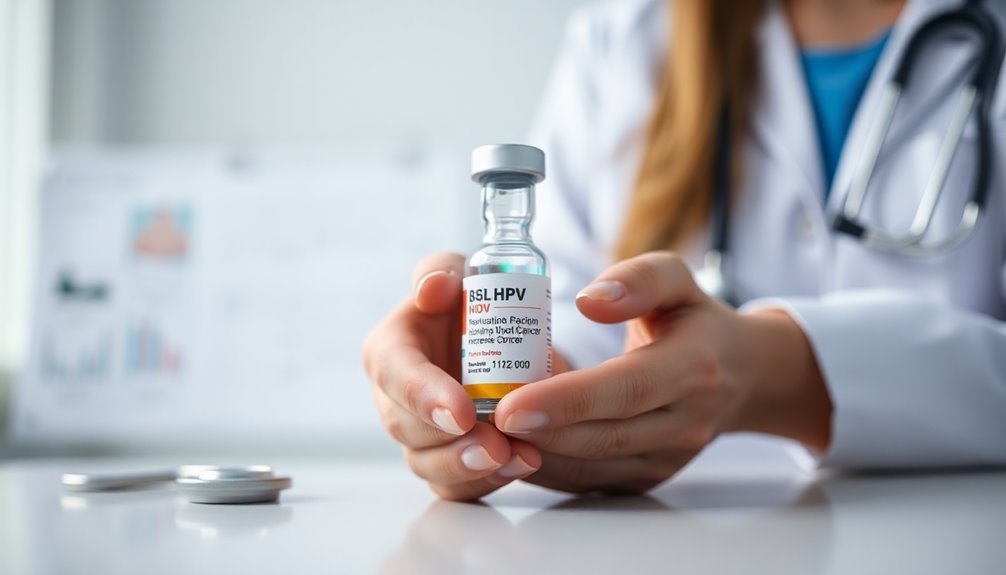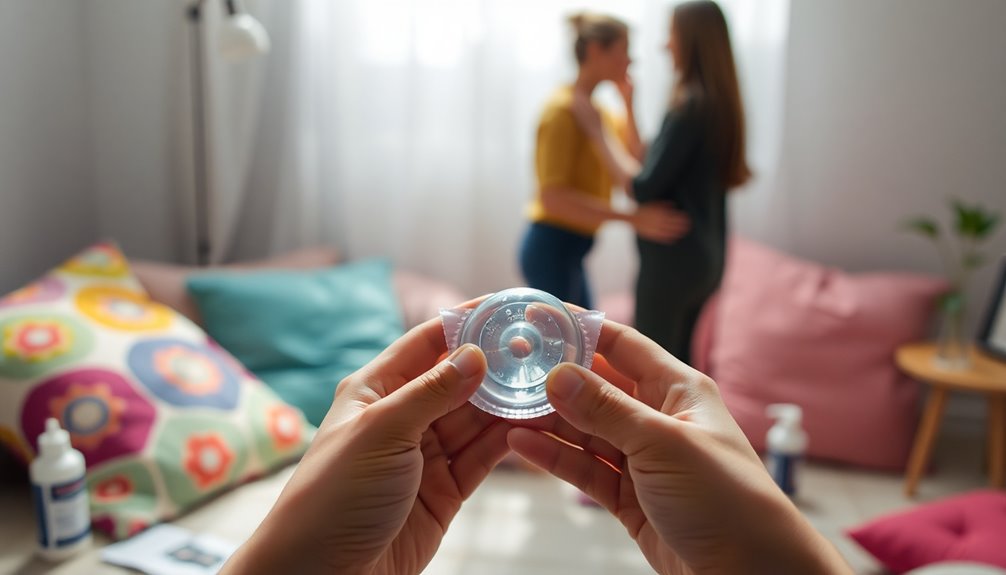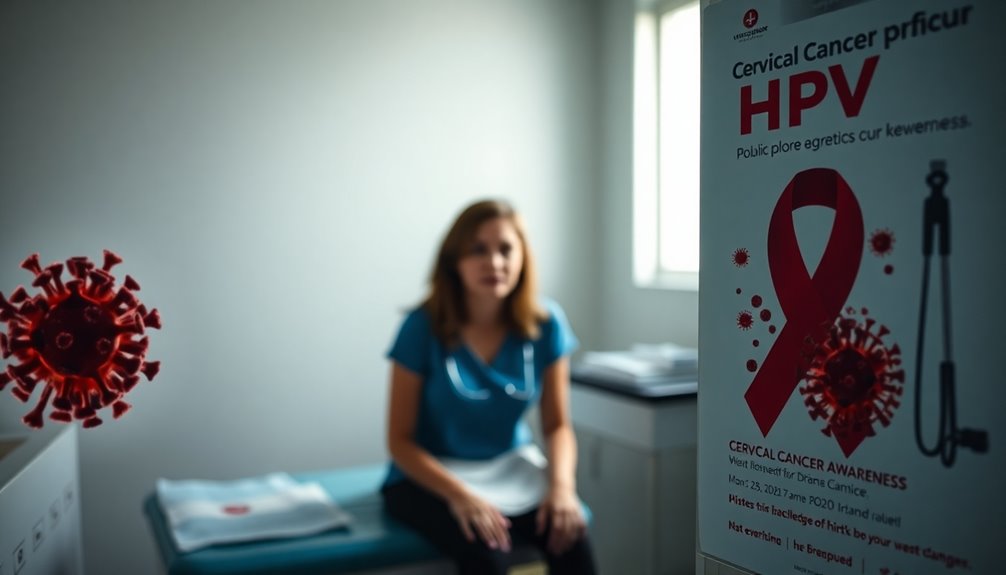Yes, oral sex can greatly increase your risk of throat cancer due to its strong association with HPV. About 70% of oropharyngeal cancers are linked to HPV, particularly the HPV-16 strain, which spreads through oral sex. If you've engaged in oral sex with multiple partners or started at a young age, your risk can increase. Lifestyle choices like smoking and drinking further complicate things by elevating your cancer risk even more. Understanding the connection between oral sex and throat cancer can help you make informed decisions about your health and protection. There's more to uncover about this topic.
Key Takeaways
- Oral sex is a significant route for HPV transmission, with 70% of HPV-related oropharyngeal cancers linked to this practice.
- Engaging in oral sex with multiple partners increases HPV exposure and cancer risk substantially.
- Individuals who begin oral sex before age 18 have a higher risk of developing throat cancer later in life.
- The combination of HPV with lifestyle factors like smoking and heavy drinking greatly elevates throat cancer risk.
- Vaccination against HPV is crucial for preventing oropharyngeal cancer, ideally administered before the onset of sexual activity.
Understanding HPV and Cancer

Understanding the link between Human Papillomavirus (HPV) and throat cancer is essential, especially since HPV is responsible for about 70% of oropharyngeal cancers. The most common strain associated with this type of cancer is HPV-16.
You should be aware that certain risk factors can increase your chances of developing oropharyngeal cancer, particularly the number of oral sex partners you have. Studies show that individuals with six or more partners face an 8.5 times higher risk.
While most HPV infections clear up on their own within two years, persistent infections can lead to serious changes in throat tissues over time.
Vaccination against HPV is a proactive step you can take to greatly reduce your risk of these cancers.
The Link Between Oral Sex and HPV

While many people mightn't realize it, engaging in oral sex can greatly increase the risk of contracting Human Papillomavirus (HPV). This virus is linked to about 70% of HPV-related oropharyngeal cancers in the U.S.
If you have multiple oral sex partners or engage in oral sex before other sexual activities, you're considerably raising your risk of developing these cancers. Research shows that individuals with six or more oral-sex partners face an 8.5 times higher risk of oropharyngeal cancer compared to those with fewer partners.
The prevalence of oral HPV infections is notable among sexually active adults, highlighting the connection between your sexual behaviors and HPV exposure. Understanding this link is essential for making informed choices about your sexual health.
Risk Factors for Oropharyngeal Cancer

When it comes to oropharyngeal cancer, understanding the risk factors is essential for you.
HPV transmission, especially through oral sex, plays a significant role in increasing your risk, particularly with certain strains like HPV-16.
Additionally, your lifestyle choices and sexual behaviors, such as the number of partners and age at first exposure, can greatly influence your chances of developing this type of cancer.
HPV Transmission Pathways
Oral sex plays an essential role in the transmission of human papillomavirus (HPV), greatly increasing your risk of developing oropharyngeal cancer.
Here are some key factors to evaluate:
- Engaging in oral sex before age 18 can elevate your chances of oropharyngeal cancer later in life.
- Having six or more oral sex partners considerably raises your risk—up to 8.5 times higher than those with fewer partners.
- Relationships with partners who are 10 or more years older can further increase the likelihood of HPV infections and subsequent cancer diagnosis.
Understanding these pathways helps you recognize the potential risks associated with oral sex and HPV exposure, emphasizing the importance of safe practices for your health.
Lifestyle and Behavioral Factors
Understanding the lifestyle and behavioral factors that contribute to oropharyngeal cancer is essential for making informed decisions about your sexual health.
Engaging in oral sex before the age of 18 greatly raises your risk, with many cancer patients reporting early initiation. If you've had six or more oral sex partners, you're facing an 8.5 times higher risk of developing HPV-related oropharyngeal cancer.
Casual or extramarital partners can increase your risk by over 1.6 times, emphasizing how partner dynamics affect HPV transmission. Additionally, deep kissing with 10 or more partners doubles your risk, while having partners who are 10 or more years older during your youth can also heighten your chances of diagnosis.
Stay informed and practice safer sexual habits.
Study Findings on Oral Sex and Cancer

Recent research reveals a troubling link between oral sex and the risk of throat cancer, particularly in patients diagnosed with HPV-related oropharyngeal cancer.
A study found that 80% of these patients had engaged in oral sex, compared to only 47% of healthy controls. Here are some key findings:
- Engaging in oral sex before age 18 increases cancer risk, with 37% of cancer patients reporting early initiation.
- Having more than 10 oral sex partners raises your risk by 8.5 times, highlighting the importance of partner quantity in HPV transmission.
- Deep kissing also contributes, as those with 10 or more partners double their likelihood of being diagnosed with throat cancer.
These findings emphasize the significant cancer risk associated with oral sex.
Immune Response to HPV

While the immune response to HPV can vary greatly from person to person, it plays an essential role in determining whether someone clears the virus or develops persistent infections that may lead to cancer.
Your immune system's ability to fight off an oral HPV infection is vital; some individuals can effectively eliminate the virus, while others struggle.
Research shows that all cancer patients tested positive for serum antibodies to HPV oncogenes, highlighting a strong immune response.
However, if your immune system fails to clear persistent HPV infections, it may cause pre-cancerous changes in cells, increasing the risk of HPV-related oropharyngeal cancer.
Understanding these responses could be key in evaluating cancer risk and guiding future interventions.
Prevention Through Vaccination

Vaccination plays an essential role in preventing HPV infections that can lead to oropharyngeal cancer. The HPV vaccine, like Gardasil 9, effectively protects against cancer-causing strains linked to 70% of these cancers.
Here are three key points about prevention through vaccination:
- Timing Matters: It's best to get vaccinated before sexual activity begins, ideally during preteen years.
- Coverage Counts: Achieving over 85% vaccination coverage is crucial for herd immunity, reducing HPV-related throat cancers.
- Gender Equality: Countries with gender-neutral vaccination policies help protect both males and females from HPV-related health risks.
Safe Sexual Practices

To reduce the risk of HPV transmission and its potential link to throat cancer, practicing safe sexual habits is crucial.
Using condoms or dental dams during oral sex can greatly lower the risk of HPV and other STIs associated with HPV-related oropharyngeal cancers.
Also, limiting the number of sexual partners helps decrease your likelihood of exposure, as having multiple partners raises transmission rates.
Open communication with your sexual partners about STI testing and health is essential for implementing safe sexual practices.
Regular dental check-ups are equally important, as they allow for early detection of any abnormal tissues related to HPV infections.
Consider these strategies to protect your health and reduce the risk of throat cancer linked to HPV.
Public Awareness of HPV Risks

You mightn't realize that Human Papillomavirus (HPV) is a major contributor to oropharyngeal cancers, especially through oral sex.
Understanding how HPV spreads and the importance of vaccination can greatly reduce your risk.
HPV Transmission Awareness
How aware are you of the risks associated with HPV transmission through oral sex? HPV can be easily passed between oral sex partners, increasing your risk of oropharyngeal cancer. Understanding these risks is important for maintaining your sexual health.
Here are three key points to take into account:
- Higher Risk: Having six or more oral sex partners raises your risk of HPV-related throat cancer by 8.5 times.
- Asymptomatic Infections: HPV infections can remain hidden for years, making regular screenings essential.
- Engagement Order: Engaging in oral sex before other sexual activities correlates with a heightened risk of oropharyngeal cancer.
Being informed about HPV transmission is necessary for making safer choices and protecting your health.
Vaccination Importance and Benefits
While many people may not realize it, getting vaccinated against HPV is one of the most effective ways to protect yourself from HPV-related cancers, including oropharyngeal cancer. The CDC estimates that about 70% of oropharyngeal cancers are linked to HPV, highlighting the vaccination significance in public health.
Unfortunately, in 2020, only 54.3% of adolescents received the recommended doses, signaling a need for greater public awareness. High vaccination coverage, over 85%, is essential for achieving herd immunity, which protects even those who are unvaccinated by reducing overall HPV transmission.
It's important to address vaccine hesitancy and combat misconceptions about the HPV vaccine, ensuring everyone understands how critical this preventive measure is for their health and the well-being of the community.
Signs of Oral Cancer

Oral cancer can present itself through various alarming signs that shouldn't be ignored.
Recognizing these symptoms early is essential, especially since some may be linked to HPV-related oropharyngeal cancer.
Here are three signs of oral cancer to watch for:
- Persistent Mouth Sores: Sores that don't heal can indicate a serious issue.
- Discoloration in the Mouth: White or red patches on soft tissues should be evaluated by a healthcare provider.
- Lumps in the Neck or Throat: If you notice lumps lasting more than two weeks, it's time for a check-up.
If you experience difficulty swallowing or ongoing earaches, don't hesitate to seek medical advice.
Early detection can make a significant difference in treatment outcomes.
The Role of Lifestyle Choices

Your lifestyle choices can greatly impact your risk of developing throat cancer.
Smoking and heavy alcohol consumption not only weaken your immune system but also heighten the dangers posed by HPV.
Additionally, the number of sexual partners you have plays an important role in your overall risk, making it essential to be mindful of your sexual health.
Smoking and Alcohol Consumption
Lifestyle choices, particularly smoking and alcohol consumption, play an essential role in the risk of developing throat cancer.
When you combine these habits, the risk of HPV-related oropharyngeal cancer skyrockets. Here are three key points to contemplate:
- Smoking: It greatly raises the risk, leading to cancerous changes in your throat and oral cavity, especially if you're also infected with HPV.
- Alcohol Consumption: Heavy drinking increases throat cancer risk, particularly when paired with smoking.
- Combined Effects: The combo of tobacco and alcohol can elevate the risk of head and neck cancers by up to 35 times compared to non-users.
Understanding these factors can help you make informed lifestyle choices for better health.
Number of Sexual Partners
While many factors contribute to the risk of throat cancer, the number of sexual partners a person has can greatly influence their exposure to HPV. Engaging in oral sex with multiple partners considerably raises your risk.
Research shows that individuals with six or more oral-sex partners have an 8.5 times higher chance of developing oropharyngeal cancer than those with fewer partners. Additionally, 45% of cancer patients reported having over ten sexual partners, highlighting a troubling correlation.
Early initiation of oral sex, especially under 18, compounds this risk. Even casual or extramarital partners increase your risk by more than 1.6 times, emphasizing that the number of lifetime partners plays a critical role in throat cancer risk.
Stay informed and make mindful choices.
Frequently Asked Questions
What Are the Risks of Oral Sex?
When you engage in oral sex, you face several risks. First, there's the chance of transmitting sexually transmitted infections (STIs), which can lead to various health issues.
If you start before age 18 or have multiple partners, your risk increases considerably. Deep kissing can also elevate your chances of infection.
It's crucial to practice safe sex, communicate with partners, and get regular health check-ups to mitigate these risks effectively.
What Is the Main Cause of Throat Cancer?
The main cause of throat cancer is a virus called Human Papillomavirus (HPV), which accounts for about 70% of oropharyngeal cancers in the U.S.
You should know that HPV-16 is the most common strain linked to this type of cancer.
Besides HPV, smoking and excessive alcohol consumption can also increase your risk.
Staying informed about these factors can help you take preventive measures and promote early detection strategies.
How Likely Is It to Get HPV From Oral Sex?
You might be surprised to learn that engaging in oral sex can greatly increase your chances of contracting HPV.
Studies show that it's not just a few partners; having six or more can elevate your risk dramatically.
If you've had multiple partners or started at a young age, your likelihood of HPV exposure rises even more.
Does Bj Cause a Sore Throat?
Engaging in oral sex can indeed lead to a sore throat.
When you perform oral sex, you might irritate your throat or contract an infection, like an STI, which can cause discomfort.
If you're experiencing a persistent sore throat, it's essential to pay attention to any other symptoms you might have, such as difficulty swallowing.
If it doesn't improve or worsens, it's a good idea to consult a healthcare provider for evaluation.
Conclusion
In the intricate dance of intimacy, it's essential to recognize the hidden shadows that can linger. While oral sex can increase the risk of throat cancer due to HPV, understanding and awareness are your shields. Embrace safe practices, and let your choices shine like a beacon, guiding you through the murky waters of health risks. Stay informed, watch for signs, and keep your body a safe harbor, free from the storms of preventable diseases.










